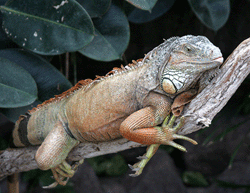|
|
|
 |
|
Did
you know? Although most people find these animals fascinating, iguanas do sometimes create challenges for Florida residents. The most frequent complaint is that they eat ornamental plants, such as orchids or hibiscus flowers. Iguanas can also cause problems when they dig holes for nesting. Misinformation about Green iguanas. Green iguanas are not native to the United States, but they have thrived in Florida for many years and are most likely here to stay. Although Green iguanas—as with all wildlife—can sometimes pose unwelcome challenges, there are humane methods of discouraging iguanas from becoming a nuisance.
• Do not feed iguanas. Feeding only encourages
animals to stick around. Trapping. In Florida it is illegal to trap and then relocate iguanas. Trappers hired to “solve” a problem involving iguanas almost always will kill the animals. Trappers often use cruel snares to capture iguanas. You
Can Help • Today, iguanas can be purchased for as little as $10, making them popular impulse purchases at pet stores. Captive iguanas often do not receive proper care and die shortly after their purchase. Others are irresponsibly released into the wild. The pet industry is ultimately responsible for the large numbers of iguanas in Florida.Contact the Florida Fish and Wildlife Conservation Commission (FWC) and urge them to take steps to ban or restrict the sale of iguanas in Florida. Contact the FWC through their website: www.MyFWC.com/Contact
Please be polite when writing. PETCO is well-known for its efforts to address the dog and cat overpopulation problem by partnering with local shelters. In addition, in response to concerns raised by animal advocates, PETCO ended the sale of large birds rabbits.
• In October 2008, Broward County commissioners passed a resolution requesting that the Florida Fish & Wildlife Conservation Commission add green iguanas to the list of "reptiles of concern." Reptiles on this list— such as pythons or anacondas— require a $100 permit to purchase. The resolution also urged the FWC to take measures to "control the possession, distribution, release and propagation of iguanas throughout the state." Palm Beach County, Monroe County and the cities of Cape Coral and Pompano Beach have approved similar resolutions. The FWC has expressed skepticism that anything can be done to decrease the numbers of iguanas already established in the wild. Although we agree that iguanas are likely here to stay, we also feel that problems can always get worse. Making it more complicated and expensive to obtain iguanas would stop impulse purchases and discourage their sale at pet stores. The new designation would hopefully cut down on the number of former "pets" who are dumped into the wild. Have iguanas been a subject of nuisance complaints in your community? Please ask your city or county commission to pass a resolution urging the Florida Fish & Wildlife Conservation Commission to designate green iguanas as "reptiles of concern." Contact ARFF; we can help. • Support ARFF. One of ARFF’s legislative priorities is enactment of a ban on the breeding, sale and private possession of dangerous exotic animals—to protect people, animals and the environment. |
|
1431 N. Federal Highway • Fort Lauderdale, Florida 33304 • (954) 727-ARFF

 Green
iguanas have been a fad pet for years. Due to their low cost and small size, iguanas are often purchased by individuals who lack the knowledge and resources to properly care for them. Unfortunately, once these reptiles become too large or expensive to care for, they are often abandoned or released into the wild. Iguanas are able to thrive in South Florida's subtropical climate. There are now thousands of the green lizards throughout south
Florida. These feral populations present unwelcome challenges for homeowners and as a result the reptiles are often cruelly mistreated.
Green
iguanas have been a fad pet for years. Due to their low cost and small size, iguanas are often purchased by individuals who lack the knowledge and resources to properly care for them. Unfortunately, once these reptiles become too large or expensive to care for, they are often abandoned or released into the wild. Iguanas are able to thrive in South Florida's subtropical climate. There are now thousands of the green lizards throughout south
Florida. These feral populations present unwelcome challenges for homeowners and as a result the reptiles are often cruelly mistreated.  •
Download and distribute ARFF's iguana brochure (
•
Download and distribute ARFF's iguana brochure (